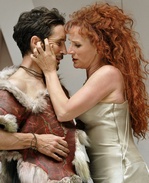SITE GUIDE
SEARCH
REVIEWS
REVIEW ARCHIVES
ADVERTISING AT CURTAINUP
FEATURES
NEWS
Etcetera and
Short Term Listings
LISTINGS
Broadway
Off-Broadway
NYC Restaurants
BOOKS and CDs
OTHER PLACES
Berkshires
London
California
New Jersey
DC
Philadelphia
Elsewhere
QUOTES
TKTS
PLAYWRIGHTS' ALBUMS
LETTERS TO EDITOR
FILM
LINKS
MISCELLANEOUS
Free Updates
Masthead
Writing for Us
A CurtainUp  London Review
London Review
 London Review
London ReviewHelen
|
I'm afraid there is no Helen of Troy
— Helen
|

Paul McGann as Menelaus and Penny Downie as Helen
(Photo: Keith Pattison) |
The action is set seven years after the fall of Troy, as the victorious Greeks are denied enjoyment of their triumph and struggle to reach home, continually shipwrecked and blown off course. However, unbeknownst to them, they fought and suffered for nothing other than a divinely-created phantom doppelganger. The real Helen (Penny Downie) was abducted by Hermes and placed in Egypt, she never went to Troy with Paris and her fidelity to her husband Menelaus (Paul McGann) was unswervingly unimpeachable. However, when the play opens, the Egyptian king Theoclymenes (Rawiri Paratene) threatens to change this, intending to force Helen into marriage with himself. Only the timely arrival of the shipwrecked Menelaus can reunite the longsuffering married couple.
Penny Downie's Helen, the woman whose famed beauty "lacerates" her, is feisty and determined, and nicely demonstrates that this character's heroic quality is also her great affliction. Paul McGann's Menelaus is sympathetic as the crushed hero who, having lost everything for nothing, now has a glimmer of hope in the chance to regain his true wife. However, these two are outshone by the excellent Rawiri Paratene as the powerful villain Theoclymenes.
The Globe's stage is transformed into a combination of the fantastical nature of the myth and the alien shore of Egypt. Pink-edged, oversized Greek letters spell out the word Helen on a backdrop of white with glittery silver curtains, and a mound of black seaweed covers one half of the stage. From this swamp of seaweed, a Mummy-style tomb and statue of Anubis peep out, in keeping with Theoclymenes' costume: full Pharoah-style regalia, kohl and headgear. Designer Gideon Davey is making the point that this is the meeting of two ancient cultures.
The Dioscuri (Helen's heavenly twin brothers) sport white suits with fully feathered angel wings and, in a clever twist, they are also stage hands in the production's first scene. And so the dei ex machina are engineers of theatre and of the world recreated there.
Frank McGuinness' new version of the play is accessible and lively. Having excised some of the more in-depth and obscure aetiological passages, he blends in low register colloquialisms. Although some phrases may appear incongruous to those expecting a stately Attic drama, others are remarkably vivid and earthy. So, for example, the gods are called "as changeable as a child's arse" but Helen, blaming herself for her mother's death, states "I am my mother's murder".
Most significantly of all, however, McGuinness' version understands Euripides' cynical, painfully humorous and polemical stance as the gods' machinations make a mockery of humanity. Although an oddity of a play, it was a pleasure to see it in the Globe's space, which is arguably one of the best contemporary auditoriums suited to Greek drama with its visible audience, open air space, and more declamatory style of acting required. All in all, this is a rare revival of a story portraying love preciously regained in the context of senseless war and suffering.
|
Helen
Written by Euripides In a new version by Frank McGuinness Directed by Deborah Bruce Starring: Penny Downie, Paul McGann, Rawiri Paratene With: Holly Atkins, Philip Cumbus, Jack Farthin, Diveen Henry, James Lailey, Penny Layden, Fergal McElherron, William Purefoy, Ian Redford, Ukweli Roach, Tom Stuart, Graham Vick, Andrew Vincent Musicians: Phil Hopkins, Irita Kutchmy, Dai Pritchard Designed by Gideon Davey Composed by Claire van Kampen Choreographed by Siān Williams This version of Helen is based on a literal translation by Fionnuala Murphy Running time: One and a half hours with no interval Box Office: 020 7401 9919 Booking to: 23 August 2009 Reviewed by Cassie Robinson based on 5 August 2009 performance at Shakespeare's Globe, 21 New Globe Walk, Bankside, SE1 9DT (Tube: London Bridge) |
|
REVIEW FEEDBACK Highlight one of the responses below and click "copy" or"CTRL+C"
Paste the highlighted text into the subject line (CTRL+ V): Feel free to add detailed comments in the body of the email and state if you'd like your comments published in our letters section. |
|
London Theatre Tickets Lion King Tickets Billy Elliot Tickets Mighty Boosh Tickets Mamma Mia Tickets We Will Rock You Tickets Theatre Tickets |




